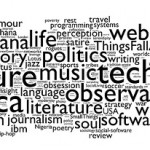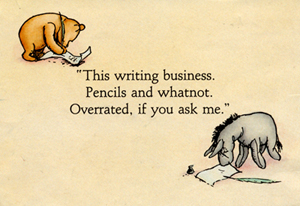As I read Kelly’s article “Scan This Book” I was struck by its utopian outlook. It felt almost like it had a Star Trek feel to it. With that in mind I thought that I would discuss the arguments for and against the Universal Library in the form of a “Captain’s Log” from Star Trek:
Captain’s log- Stardate 5938.3:
I have been enjoying reading the novels of 21st century Earth held within Unilib (our Universal Library). It is hard to imagine that people of that time were opposed to the digitization of all books. Concerns over copyright and advertising revenue seemed to dominate the debate over whether or not it would be a good thing to have free access to all books ever written. Now it seems unthinkable to live without Unilib. Just imagine what would have happened to great countries like Somalia and Afghanistan had they not been given the free access to these documents in their language. No doubt their populations would have remained impoverished and unenlightened, forever looking for help from the countries who were wealthy enough to learn from the books they purchased and which their poorer cousins were unable to afford.
What if Unilib failed to emerge? Our world would be vastly different. We would not have developed the deep collaborative spirit that emerged among all readers as they linked, tagged and bookmarked. The vast mashups of reading material would have never materialized. A greater sense of understanding and authority arose as more and more knowledge was linked and connected to each other. Cures for cancer, diabetes and heart disease would not have been imagined because there would not have been the interconnectiveness of the vast scientific wealth.
Thank goodness the differences between the copyright holders and those interested in digitizing the world’s books were able to be settled. Authors whose works lived in obscurity began to become more popular as social book networks virally distributed links to their works. Universities were able to expand their libraries overnight because the cost of a digital book was miniscule compared to the cost of hardcover text.
Not only did universities increase their collection of human knowledge, the entire world did as well. Man’s history was more accurately depicted once governments and publishers no longer asserted and inserted their view of historical events. A more complete picture arose as readers from all walks of life, ethnicity and nationality added links and tags to historical documents. This collective and connected account of man’s story helped foster a better understanding between nations which ultimately led to the formation of our world government and a redistribution of the earth’s resources.
Our universe would be dramatically different had the United States Congress not passed their controversial copyright law of 2100. This law extended copyright indefinitely. The outcry and revolt that followed led to the great consumer boycott of 2112. This boycott, which was organized by Jim Gates (Bill Gates’ great, great grandson), called all consumers to refuse to purchase any product that was covered by copyright law. The resulting economic crash brought the mega corporations of Sonysonic and MicroApple to their senses. They soon were able to work out an agreement that allowed consumers to use intellectual property and at the same time reward those who created the content.
With opposition due to copyright removed Google, Carnegie Mellon University, Microsoft, Yahoo and other interested parties were all able to pursue their digitization projects. It soon became apparent that they should combine forces in order to create a single project that would amount to the world’s single book. With copyright no longer being a concern Google’s practice of having authors opt out of the digitization project was no longer in effect.
Google’s original strategy of having authors opt out had some legacy issues. It is interesting to note how this practice transferred to other segments of the society. Employers used this model to gather sensitive information on their employees if the employees did not opt out of the human medical data base initiative. Governments collected confidential information on the citizens who did not opt out of the Big Brother data bank.
The Unilib movement did have its critics. There were those who claimed that “scanning books and chucking their poor innocent words into a vast, searchable database will only create massive intellectual fraud and confusion” (Keen, 2007) They argued that “taking a few words out of one text, replacing them with a few words from another, is the surest way to undermine the coherence of any textual argument” (Keen, 2007) and that “(re)mixing great books like Plato’s Republic with Hobbes Leviathan will create intellectual garbage.” (Keen, 2007) Fortunately these fears proved to be unfounded as readers fully engaged in the process of reading. The concern that readers would not chose to read entire books was unfounded. Not only did people read complete works but they then created remix anthologies that linked works of a common thread. It was from these threads that humans have been able to evolve to where we are today: a united species seeking self-improvement over financial gain. Without the Universal Library this would not have been possible. Thank goodness mankind was able to work together to create the cornerstone of our society.
References:
Birt, Y. (n.d.). Wisdom and the Universal Library. Retrieved September 22, 2009, from Yahya Birt: http://www.yahyabirt.com/?p=60
Dyson, G. (2005, November 30). The Universal Library. Retrieved September 20, 2009, from Edge The Third Culture: http://www.edge.org/3rd_culture/dyson2.05/dyson2.05_index.html
Google’s Book Scanning Hits Snag. (2008, May 12). Retrieved September 26, 2009, from Wired: http://www.wired.com/culture/lifestyle/news/2005/08/68513
Grafton, A. (2007, November 5). Onward and Upward With The Arts. Retrieved September 19, 2009, from The New Yorker: http://www.newyorker.com/reporting/2007/11/05/071105fa_fact_grafton?currentPage=all
Keen, A. (2007, March 6). Why Google’s universal library is an assault on human identity. Retrieved September 22, 2009, from Blogs ZD Net: http://blogs.zdnet.com/keen/?p=107
Kelly, K. (2006, May 14). Scan This Book. Retrieved September 17, 2009, from Etec 540 website: https://www.vista.ubc.ca/webct/urw/lc5116011.tp0/cobaltMainFrame.dowebct?JSESSIONIDVISTA=5D50KDDPcHTpY10GpYpyjhCc1NYhlkMXYvhjqwsG2LwJjJHplQBH!-1842142989!node07.vista.ubc.ca!20001!-1!-1938337275!node08.vista.ubc.ca!20001!-1
Manjoo, F. (2009, May 6). Your Search Returned 12 Million BooksGoogle’s goal of a universal online library would be great for humanity. It can still be great for authors and publishers, too. Retrieved September 25, 2009, from Slate: http://www.slate.com/id/2217804
O’Donnell, J. J. (n.d.). The Virtual Library:An Idea Whose Time Has Passed. Retrieved September 25, 2009, from http://web.archive.org/web/20070204034556/http:/ccat.sas.upenn.edu/jod/virtual.html
Prpick, S. (Composer). (2009). The Great Library 2.0. [C. R. Ideas, Performer] unknown, unknown, unknown.
Sherman, C. (2006, May 18). Building the Universal Library. Retrieved September 21, 2009, from Search Engine Watch: http://searchenginewatch.com/3607081
Unknown. (2009, June 22). ITC Library. Retrieved September 23, 2009, from ITC: http://www.itc.nl/library/General_info/million_book.asp
 There is a global conflict taking place. That battle occurs not in cities and towns but in the hearts and minds of members of the global community. If this sounds alarmist and hyperbolic it is and encapsulates the sentiments of Neil Postman in his introductory chapter titled, “The Judgement of Thamus” (Postman, 1992). Postman (1992) is of the mind that technology in the form of television and computers are influencing society in general and students specifically in profoundly negative ways. He cautions us that before a technology is readily accepted into a culture the negative aspects of that technology must be considered. He present a very narrow definition of technology. Postman fails to recognize that, “Technologies are not mere exterior aids but also interior transformations of consciousness.” (Ong, 1982, p.81). Postman’s technological deterministic stance is moderated by the work of Ong (1982) and Chandler (1994). To say that consciousness is being fundamentally altered is a stretch but are we being influenced by the shift from a print based culture to a hypertext media? Most likely. What these changes to our consciousness are and to what degree will have academics debating for years.
There is a global conflict taking place. That battle occurs not in cities and towns but in the hearts and minds of members of the global community. If this sounds alarmist and hyperbolic it is and encapsulates the sentiments of Neil Postman in his introductory chapter titled, “The Judgement of Thamus” (Postman, 1992). Postman (1992) is of the mind that technology in the form of television and computers are influencing society in general and students specifically in profoundly negative ways. He cautions us that before a technology is readily accepted into a culture the negative aspects of that technology must be considered. He present a very narrow definition of technology. Postman fails to recognize that, “Technologies are not mere exterior aids but also interior transformations of consciousness.” (Ong, 1982, p.81). Postman’s technological deterministic stance is moderated by the work of Ong (1982) and Chandler (1994). To say that consciousness is being fundamentally altered is a stretch but are we being influenced by the shift from a print based culture to a hypertext media? Most likely. What these changes to our consciousness are and to what degree will have academics debating for years.
